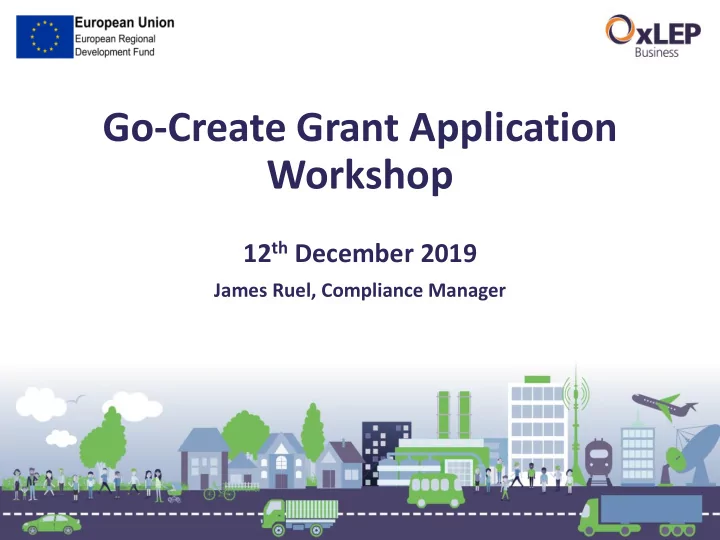

Go-Create Grant Application Workshop 12 th December 2019 James Ruel, Compliance Manager
Agenda • What support is available • Find out if you are eligible • How to apply • The rules • Key dates • Why applications are un successful • Separate into groups for Elevate, Go- Create and eScalate grants
Introductions • Who you are • Name of business (if you have a business) • Business / business area • OxLEP – who we are and what we do
Innovation Support for Businesses • Innovation facilities • Eco-business Centre • Agile & Labs • Smart Oxford Co-working space • Innovation support products Grants • Go-Create Grants • Partners: Facilities • OCC, OxLEP, University of Oxford, Oxford City Council, Cherwell District Business Council, Oxford University Hospitals Support Trust
Go-Create grants Budget £875,000.00 Committed £409,917.80 Uncommitted £465,082.20 Max grant £50,000 (anticipated) Grant rate 33% minimum* * 25% preferred.
Eligible activities – Go-Create Grants • Revenue, i.e. no asset over £5k • Investment in product and service development • Technological and applied research • Developing pilot lines • Early product validation actions • First production
Key eligibility issues - Go-Create • No staff costs for pre-existing staff • New or temporary staff costs only • VAT can be included only if you are not registered for VAT or cannot recover VAT from HMRC (seek advice) • Procurement audit trail and three quotes
What can’t we fund? • Salary replacement costs (avoid all salary costs, if possible) • Travel and expenses • VAT payments you can recover from HMRC • Any other debt or refinancing costs or statutory/legislative requirements • Training – does not include leadership and management development, e.g. mentoring • Vehicle purchases or any HP arrangements
What can’t we fund? • Vehicle purchases or any HP arrangements • Like for like or routine replacement or preventative/remedial maintenance • Building or refurbishing retail facilities • Some specific sectors: • the primary production of agricultural goods and fisheries/aquaculture; • road freight; • services of general economic interest; • export related activities; and • activities favouring domestic over imported goods.
Eligibility – SMEs • SME • Less than 250 employees • Not more that 25% owned by a non- SME and • Turnover less then 50m euros; AND/OR • Balance sheet less than 43m euros
Eligibility – Innovation Project • SME • Innovation • Product • Process • Service • Ineligible sectors • the primary production of agricultural goods and fisheries/aquaculture; • road freight; • services of general economic interest; • export related activities; and • activities favouring domestic over imported goods.
Undertakings in difficulty • Does not include SMEs less than three years old • An undertaking (SME) that is: • Limited liability company: more than half of subscribed share capital has disappeared as a result of accumulated losses • Unlimited liability company: more than half of its capital has disappeared as a result of accumulated losses • Subject to insolvency proceedings • SME in receipt of rescue or restructuring aid
Deliverables that we must report • Grant • Match • Employment increase: new jobs • New products to the firm / market • New businesses • Evidence is needed…there’s a form…
How to apply? • Read the guidance on the website • Speak to the Team • Complete the application form, use the checklist • Wait and see… Opening date Deadline for Closing date Decision date Latest date checking service applicants will be informed 27 th November 16 th January 6 th March 2020 3 rd February February 2020 2019 2020 2020, midday
How does it work? • Grant Offer • Total eligible spend £40,000 • Maximum grant offered £10,000 • Grant rate 25% of total eligible spend • Scenario 1 • Total eligible spend £30,000 • Maximum grant we can pay is £7,500 (£30,000 x 25%) • Scenario 2 • Total eligible spend £50,000 • Maximum grant we can pay is £10,000 (the maximum grant offered)
The rules… • We can reimburse only defrayed expenditure incurred after the date of the Grant Offer Letter • Procurement rules – three quotes are required • Evidence is key • Flexible or rigid…
Why are applications unsuccessful? • Length – think Goldilocks… • Obtuse – so keep it clear and simple • Style – spellchecker is there for a reason • Quality – • Take your time • Use our checking service • Be consistent • Complete everything – if a box is blank, could you put N/A in it and it still makes sense?
Content • Prior knowledge • “It goes without saying…”, it never does… • Starting at the beginning, go on to the middle and finish at the end! • Relevance of content • Telling a story – what do we need to know? • Using attachments / additional documents
Process • RTQ • ATQ • Three quotes means three quotes … • If it really is impossible then you’ll have confirmation from companies that they can’t quote • “But I’m different…” • “We’ve worked with them before…” – that’s the point about competition!
Discussion – what makes a good application
When you have a grant • Wait until grant awarded before spending, etc. • Actually spend it… • Then claim it! • If there are delays, please tell us • Provide the necessary evidence with your claim • Highlight anything that differs from the application
James Ruel Compliance Manager james.ruel@oxfordshire.gov.uk
Recommend
More recommend